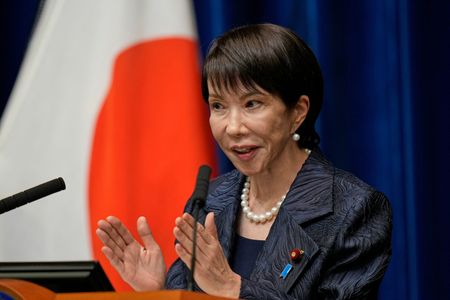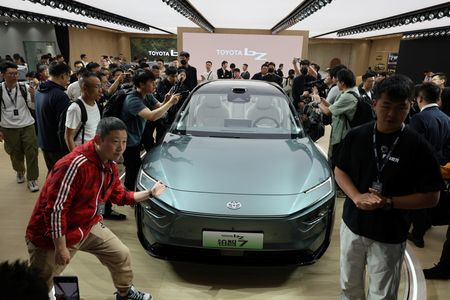By Leika Kihara
TOKYO (Reuters) -Japan’s new prime minister, Sanae Takaichi, said on Tuesday she hoped the central bank would conduct monetary policy to sustainably achieve 2% inflation driven not just by rising raw material costs but also by wage gains.
Monetary policy is part of a broader economic policy the government holds final responsibility for, Takaichi said, adding that specific means of monetary policy were up to the Bank of Japan to decide.
“What’s most important is for the BOJ and government to coordinate policy and communicate closely,” she told a news conference.
“I hope the BOJ conducts monetary policy appropriately towards sustainably and stably achieving its price target driven not just by cost-push factors, but accompanied by wage gains,” Takaichi said.
Takaichi made the remarks when asked whether further rate hikes by the BOJ were appropriate partly to avoid low borrowing costs from triggering unwelcome yen falls.
The BOJ’s next two-day policy meeting ends on October 30, with its board due to conduct a quarterly review of its growth and inflation forecasts and debate whether to raise interest rates from the current 0.5%.
Takaichi, known as an advocate of expansionary fiscal and monetary policy, was elected Japan’s first female prime minister on Tuesday. The parliament vote drove down the yen and bond yields on expectations Takaichi’s presence could delay further interest rate hikes by the BOJ.
Takaichi said she had no immediate plan to revise a joint agreement between the BOJ and government pledging to cooperate in pulling Japan out of economic stagnation.
The joint statement, first agreed on in 2013, focuses on the need to exit deflation – a policy priority at the time but one seen by analysts as growing outdated as the rising cost of living becomes Japan’s more pressing economic problem.
(Reporting by Leika Kihara; Editing by Chizu Nomiyama and Hugh Lawson)










